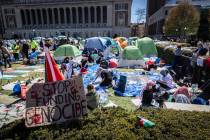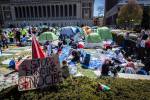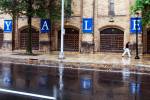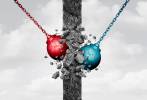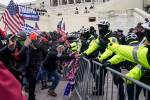Stolen property
The ownership of tens of billions of dollars worth of art and other goods currently moving "in global commerce" could be thrown into doubt if a lawsuit seeking the return of a Vincent Van Gogh painting is successful, Yale University asserts in a recent court filing.
The Connecticut university sued in federal court in March to assert its ownership rights over "The Night Cafe" and to block a descendant of the original owner from claiming it. Pierre Konowaloff is the purported great-grandson of industrialist Ivan Morozov, who bought the painting in 1908.
The Bolsheviks seized Mr. Morozov's property without compensation during the communist revolution. The painting, which the Soviet government later sold, has been hanging in the Yale University Art Gallery for almost 50 years.
"Invalidating title to the painting would set U.S. courts at odds with the Russian government and cloud title to what Konowaloff concedes is at least $20 billion of art in global commerce," Yale's attorneys wrote in papers filed last week.
That would create "significant tensions" between the United States and the Russian Federation, Yale argues.
Oh dear. By challenging Yale's title to the stolen property, American courts might upset the thugs now in charge of Russia, who continue to enjoy proceeds from all that stolen loot?
Former owners have challenged titles to artwork and other property seized from them in Russia, but their claims were rejected by the U.S. Supreme Court and other courts, the university's attorneys claim.
Now, common sense says some time limit must apply. Shall we throw out all land titles in the Western United States to honor aboriginal claims to these lands as hunting preserves?
On the other hand, the Bolshevik attitude toward property rights threw their own nation into a century-long tailspin of poverty and repression, and led the Russian communists -- many of whom survive and prosper -- to terrorize and murder millions as they realized the only way for their despicable system to survive was to constantly devour and imprison the remaining wealth-producers on their frontiers.
To avoid embarrassing anyone, are we now obliged to say that was all OK, that it's not for us to judge whether they had a right to seize that stuff? No. A thousand times no. Bolshevik collectivism was more than wrong. It was evil unbounded.
Does Yale contend -- does it now teach its students -- that it is it wrong to deal in stolen property ... unless it was stolen by some Nazi or communist bully-boy with a sweat-stained uniform, a rifle and some official government badge? Wouldn't it be a finer lesson to their students to apologize for having purchased stolen goods, and return the painting to its rightful owner?
Mr. Konowaloff's attorney, Allan Gerson, responded in an e-mail last week that Yale's argument is "ridiculous," that Mr. Konowaloff's lawsuit is not against Russia. He has argued that the court does not have to determine the lawfulness of the Russian confiscation of the painting, saying Yale cannot establish that it has good title.
Perhaps. But finding that the Bolshevik Revolution -- with its murders, its property seizures, its abrogation of human rights on a scale previously undreamed -- was neither lawful nor acceptable in the eyes of God and man, is to be preferred.
Or are the millionaire leftist scholars of Yale still hoping to see it all happen again -- in the name of "social justice"?
















